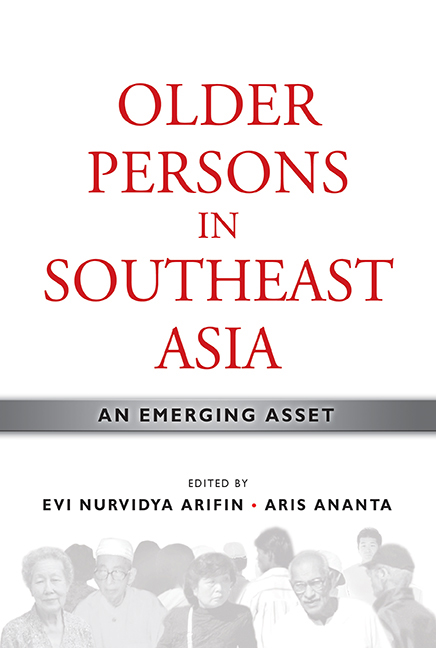Book contents
- Frontmatter
- Contents
- List of Tables
- List of Figures
- Foreword by Hal Hill
- Message from the Director
- Preface
- Contributors
- PART I INTRODUCTION
- PART II OLD-AGE INCOME SECURITY
- PART III EMPLOYMENT AND OTHER SOURCES OF FINANCIAL CONTRIBUTION
- PART IV AGEING, MIGRATION, AND DEVELOPMENT
- PART V ROLES OF GOVERNMENT AND CIVIL SOCIETY
- 14 Ageing, Finance, and Civil Society: Notes for an Agenda
- 15 Evaluation and Implementation of Ageing-related Policies in Indonesia
- Index
14 - Ageing, Finance, and Civil Society: Notes for an Agenda
from PART V - ROLES OF GOVERNMENT AND CIVIL SOCIETY
Published online by Cambridge University Press: 21 October 2015
- Frontmatter
- Contents
- List of Tables
- List of Figures
- Foreword by Hal Hill
- Message from the Director
- Preface
- Contributors
- PART I INTRODUCTION
- PART II OLD-AGE INCOME SECURITY
- PART III EMPLOYMENT AND OTHER SOURCES OF FINANCIAL CONTRIBUTION
- PART IV AGEING, MIGRATION, AND DEVELOPMENT
- PART V ROLES OF GOVERNMENT AND CIVIL SOCIETY
- 14 Ageing, Finance, and Civil Society: Notes for an Agenda
- 15 Evaluation and Implementation of Ageing-related Policies in Indonesia
- Index
Summary
At the turn of the twentieth century, social and political movements under the banner of civil society had become widely recognized forces of public debate and policy reform in many parts of the world. “Civil society” refers broadly to institutional activities, largely or entirely independent of the state, that provides information and enables open discussion of contemporary issues. Civil society often extends to the provision of services where state activities are insufficient. Exact definitions of civil society, however, have always been difficult, since its institutions exist in relation to the structures of the state, and the capacities they are able to develop are bound to vary accordingly. Because states in some parts of world and stages of history have tried to stifle independent discussion, the state and civil society are sometimes seen as inherently opposed. More generally, however, the state and civil society are mutually reinforcing, a flourishing and open civil society depending on a strong, democratic state, and vice versa.
To understand the renewed importance of civil society, at least three recent and major historical developments need consideration. This chapter begins by outlining these, as this helps us to see both how forms of civil society vary, and why the values and institutions of civil society provide a crucial link between finance and ageing. There are, however, limitations and unsolved problems, at least in Western traditions of civil society. Just because the phrase “civil society” and its most widely advertised traditions are closely associated with the West, we should not approach issues of ageing and finance as if they can be resolved simply by applying European models.
Two correctives may be introduced. First, there exists a substantial body of historical scholarship on the problems that European civil society has experienced. These problems may be observed both in market-driven solutions and socialist variants. Population ageing turns out to be a good example of the kind of economic and social problem that European models have found difficult to address. This suggests that the developing world will need to build its own innovative solutions to how the state and civil society organizations can work together. Second, the example of civil society institutions in Indonesia is introduced as a case study that enables differences from, and similarities to European experience to be observed and discussed.
- Type
- Chapter
- Information
- Older Persons in Southeast AsiaAn Emerging Asset, pp. 361 - 391Publisher: ISEAS–Yusof Ishak InstitutePrint publication year: 2009



